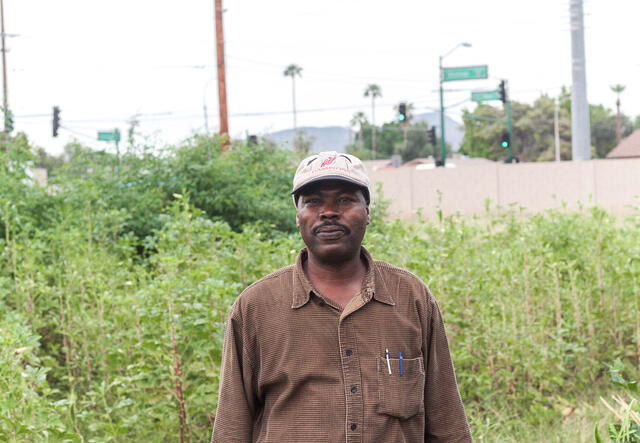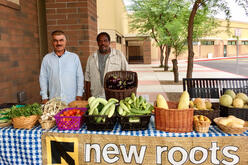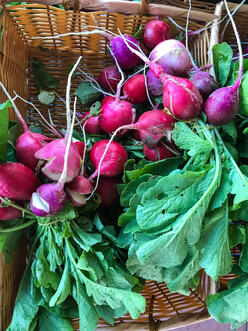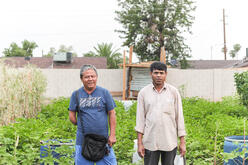
“I have always enjoyed farming and working with my hands,” says Abdelmonein Korsi, a New Roots grower and Sudanese refugee who arrived in Phoenix in September 2002. “Back in Africa, my family grew a lot of okra and corn and so they taught me how to grow when I was very young.”

Self-sufficiency is one of the most important things that the International Rescue Committee (IRC) can hope to support incoming refugees to achieve. While the IRC in Phoenix offers many programs aimed at self-sufficiency, the New Roots Community Farm and Garden program is a unique program. New Roots is a food security program that focuses on giving participants the opportunity to grow their own produce for their family or for sale in a market.
“I’m a very hard worker,” says Korsi. “I work ten hours a day, every day. This is my escape from all of that. Early Mornings, late nights, it doesn’t matter. I come here whenever I can.”
With Phoenix having many areas labeled as “food deserts”, meaning an area in which it is difficult to obtain affordable and quality fresh food, the New Roots program is a valuable space for refugees living in these food deserts to get their hands dirty and grow their own food.
“It’s always good to be farming by hand and eating something that you know and are comfortable with,” says Korsi. “It’s better to get out here and do something. It does nobody any good to stay at home and watch TV.”

One of the many aspects that makes the New Roots program unique is the emphasis on training the refugees how to sell their produce in the community. On top of taking home fresh food, many of the growers are then able to turn a profit to help financially support themselves and their families.
“We offer extensive training and resources for the growers if they choose to sell their produce,” says program coordinator Beth Anne Martin. “Topics such as budgeting, English training, and direct vs. indirect marketing skills are all part of the curriculum.”
While the IRC encourages those who grow at the farm to sell some of their produce back to the community, the most important thing is providing food security for the growers and their families. With rising prices of food, especially fresh produce, this is also a great way to ensure healthy diets for incoming refugees.
“I will always prefer to eat organic foods, and when I grow here I know that what me and my family are eating will be healthy,” explains Korsi. “I grow everything by hand and there are no chemicals used, so I can feel good when me and my family eat it.”
In addition to helping the refugees acclimate to the United States, Beth Anne notes that another significant impact of the program is the positive mental health benefits.
“We have read studies that have shown that if you are out in gardens and connecting with other people, you tend to lead a happier life,” says Beth Anne. “The garden gives a lot of our growers a sense of purpose and the feeling of more control over their lives here in America.”

Korsi has been a faithful grower at the IRC’s New Roots Garden for almost a year now and he primarily grows produce that is native to Sudan, his favorite being okra. By harvesting these familiar crops, the growers are able to hold on to a positive element of their previous lifestyle that might otherwise have been lost in the transition to Phoenix.
“I love to give back to my Sudanese friends and family by always giving them some of my food,” says Korsi. “It makes me feel good knowing that I can help to continue our culture through food.”
For these growers, being able to harvest just a small piece of their native culture goes a long way in making their new lives here in America feel a bit more like home.
Story and photos by Sam Riedel.